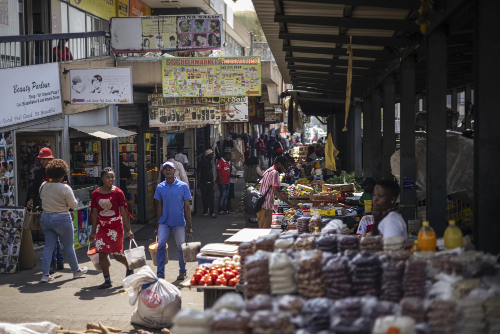South African Consumer Confidence Falls to Two-Year Low on US Tensions

TLDR
- Consumer confidence in South Africa fell to its lowest level since Q2 2023 as concerns over tax hikes and strained US relations hit sentiment
- The FirstRand Consumer Confidence Index dropped to -20 in Q1 2025 from -6 in the previous quarter, First National Bank said on Tuesday
- The drop in sentiment signals growing pressure on households as inflation, tight monetary policy, and rising fiscal burdens weigh on spending capacity
Consumer confidence in South Africa fell to its lowest level since Q2 2023 as concerns over tax hikes and strained US relations hit sentiment. The FirstRand Consumer Confidence Index dropped to -20 in Q1 2025 from -6 in the previous quarter, First National Bank said on Tuesday.
The Johannesburg-based bank attributed the decline to fears of higher taxes and global diplomatic tensions. Finance Minister Enoch Godongwana proposed raising the VAT rate to 16% by mid-2026 and plans to hold income-tax brackets unchanged, effectively increasing personal tax through bracket creep.
FNB also cited anxiety over South Africa’s worsening relationship with the United States. Trade uncertainty and political tensions, including past criticism from former US President Donald Trump over South Africa’s land policies and foreign alliances, have heightened economic concerns. The drop in sentiment signals growing pressure on households as inflation, tight monetary policy, and rising fiscal burdens weigh on spending capacity.
Daba is Africa's leading investment platform for private and public markets. Download here
Key Takeaways
South Africa's consumer confidence slump highlights deepening pressure on household finances. A proposed VAT hike and unadjusted income tax brackets could reduce real disposable income, affecting spending in an economy where consumption accounts for roughly 60% of GDP. Weaker household sentiment is especially concerning amid persistent inflation and high interest rates. FNB warns this erosion in both ability and willingness to spend may drag on economic recovery, especially with real wage growth remaining weak. The downturn also coincides with trade and diplomatic tensions with the US, South Africa’s second-largest export market. Further disruptions could add external pressure to domestic headwinds. With elections approaching and fiscal targets under strain, the government faces a delicate balancing act between revenue mobilization and protecting consumer demand. Policymakers will need to weigh the economic impact of higher taxes against the risk of recession-like conditions if household consumption collapses.

Next Frontier
Stay up to date on major news and events in African markets. Delivered weekly.
Pulse54
UDeep-dives into what’s old and new in Africa’s investment landscape. Delivered twice monthly.
Events
Sign up to stay informed about our regular webinars, product launches, and exhibitions.




